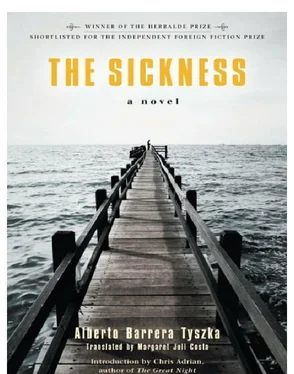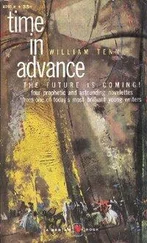“It doesn’t smell of anything,” his father says again.
Andrés doesn’t dare look at him now, he hears only the faint sigh of a small wave breaking next to them. They’re both sitting on the sand, and when the wave washes over them, it only reaches their navels. What is he waiting for? How much longer can he delay mentioning what is becoming increasingly obvious? His father is gazing out to sea, sniffing the air. He’s holding his cup of wine in one hand when, all of a sudden, he has a coughing fit, he’s doubled up with coughing, the cup trembles in his hand, then falls into the water. He can’t stop coughing. Andrés tries to help him, the wine is staining the sea red, the sea has turned to red wine. When his father manages to straighten up, his face is contorted, as if he were suffocating, and then Andrés realizes that his father has vomited into the water, has vomited blood, that it isn’t wine, the redness surrounding them, dyeing the water around them, spreading the color toward the horizon, staining the sand red too. The sea is suddenly full of blood, his father’s blood.
What does the water smell of now?
Andrés cleans his father up and reassures him. They go to a nearby first-aid station on the road, and then to a pharmacy. Andrés tells him that it’s a mild form of food poisoning, that it was probably the tuna in soybean oil they ate at lunchtime that has upset his stomach. That night, his father goes to bed early and Andrés takes a sleeping pill. The following day, they have to take the ferry back. He dreams again, and again he can’t remember what he dreamt. He wakes up with a dry mouth. As he brushes his teeth, he considers writing a letter, writing his father a long letter, telling him the truth and explaining how difficult it is for him to tell him the truth. He immediately realizes what a ridiculous idea this is. Writing a letter is the coward’s way out, something you would only do out of fear.
Karina cannot understand how quickly this correspondence has become a compulsion. Since Dr. Miranda left for Isla Margarita, Ernesto Durán hasn’t stopped writing. Each morning, when she arrives at the office, there’s a letter waiting for her. Each evening, before she leaves, Karina sends him a reply that she has slowly, throughout the day, been writing and rewriting, carefully, devotedly drafting and redrafting. She has bought a dictionary so as not to keep repeating the same words. She takes great pains over getting the right tone. That is what she finds hardest. Because sometimes she feels tempted to let herself go and forgets that it’s supposed to be Dr. Miranda who’s writing, even though she knows Dr. Miranda would never write quite as she does. There are particular words and turns of phrase that could only come from her. And yet the letters are also half her and half Dr. Miranda, a place where their two styles coexist.
Generally speaking, they have kept to strictly clinical matters in their letters. Thus Karina has learned that what Ernesto Durán refers to as the sickness —always in italics and virtually omnipresent — started with a case of labyrinthitis or suspected labyrinthitis. One morning, when he got out of bed, he felt as if he had completely lost his sense of balance. In order to remain standing, he had to lean on something or someone. Everything became a walking stick or a banister. After doing the rounds of various specialists, he began a treatment intended to deal with a minor infection of the middle ear. After that, however, everything became rather confused. Even though it seemed that the physical problem with his ear had been cured, the symptoms refused to go away. Durán would wake each morning with the same sense of fragile balance. He would stand up and immediately feel that his own body had become a precipice, that at any moment he might fall. The doctors treating him assured him he was fine, that it was biologically impossible for him to feel what he was feeling or what he said he was feeling; he would insist that he was the only one who knew what was really happening. “Who is the subject of the sickness?” he would ask. “The doctor or the patient?”
Ernesto Durán tried everything, the very latest in Amazonian homeopathy and so-called systemic medicine; he underwent an operation — without surgical instruments and on the banks of a river, near Maracay — performed by a Chinaman who spoke only Portuguese. He also allowed a nun from the convent of San José de Tarbes to place her hands on his abdomen while they said the rosary together. Nothing worked. Only time, Ernesto Durán said, had helped him to live with or, rather, despite his sickness.
The daily presence of the letters, the permanent dialogue with that voice, however, has gradually created a different kind of intimacy. Ernesto Durán has become increasingly important in Karina’s life. The other evening, on the train, she found herself thinking about him. At the weekend, at home, she thought of him again. And she spent a large part of Saturday morning imagining him: Where did he live? What would his apartment be like? Did he make his bed every morning? What did he have in his fridge? Was his place a total mess or was he neurotically tidy? What kind of music did he listen to? Did he have a girlfriend? Was that the real origin of all his ills? Was his divorce the cause of all this suffering?
Karina even dreamed up a scenario in which Ernesto arrived home unexpectedly and found his wife having sex with a neighbor. Right there in the living room. When he opened the door, Ernesto saw his wife naked and licking the penis of the man from apartment 3C. It was one of those dreadful situations, in which no one knew quite how to react. She withdrew slightly. The neighbor took a step back. Ernesto was trembling. The penis remained erect in the middle of the living room. That was perhaps the worst, the most brutal thing: that his neighbor’s penis should show no respect and remain quite unaffected by the situation. She wiped her lips with her hand. Ernesto stared at her, astonished, paralyzed by surprise. The neighbor appeared to have eyes only for his clothes in a pile on the floor, as if he were lost at sea and searching desperately around for a life preserver or a life jacket. When she realized what she was doing, Karina instinctively shook her head, trying to drive that threesome out of her Saturday morning. That was when she first began to feel anxious: why was she thinking about such things? What were they doing inside her head, Ernesto Durán’s ex-wife and the neighbor? What the hell did all that have to do with her?
“You’re getting hooked,” says Adelaida in a gently mocking voice.
Adelaida is her copy editor. Every afternoon, she reads the latest missive, offers opinions and criticisms, and suggests changes, always erring on the side of boldness. She suffers none of the doubts or pangs of conscience that sometimes trouble Karina. Adelaida is determined to see in this story the seeds of a Hollywood romance. If Karina had a partner or a boyfriend, or at least slept with someone once a week, she probably wouldn’t have been so easily captivated, trapped like an insect, by the words of that imaginary invalid, that madman. So, at least, Adelaida thinks. Perhaps it’s fate. The roads of loneliness are infinite, she says.
Karina is confused too. The imminent return of Dr. Miranda makes her even more nervous. She doesn’t think it’s possible to keep up this farce for very much longer. Sooner or later, Ernesto Durán will phone or come looking for Andrés Miranda. And what then? What will happen then? Inevitably, in less than a second, the very thing that had seemed to her harmless and amusing will become dangerous and tragic. She’s filled with anxiety. She can’t understand how she could have gone so far, she can’t understand how she could have allowed herself to be persuaded to answer that letter, passing herself off as the doctor. She should never have taken that first fatal step. Lying is a hard drug to kick, and now she doesn’t know how to extricate herself from that lie, how to get rid of it. She isn’t even sure she wants to. Each time she writes, Karina feels as if she were standing on an invisible line, on a knife-edge separating two very different types of words: on the one hand, there are the dry, sober, businesslike, opaque, correct, well-chosen but dull words; on the other, are the brilliant, sharp, lush, disorderly, carnivorous, voluptuous, uncontrollable words. She’s finding it harder and harder to keep the balance. She’s gradually losing confidence in herself.
Читать дальше












